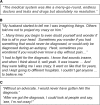The patient journey to diagnosis and treatment of autoinflammatory diseases
- PMID: 30189864
- PMCID: PMC6127942
- DOI: 10.1186/s13023-018-0902-7
The patient journey to diagnosis and treatment of autoinflammatory diseases
Abstract
Background: Limited data are available on the experiences of patients with autoinflammatory diseases (AIDs) and their families along the path to diagnosis and treatment. We sought to describe these experiences in patients with AIDs including tumor necrosis factor receptor-associated periodic syndrome (TRAPS), mevalonate kinase deficiency/hyperimmunoglobulin D syndrome (MKD/HIDS), and familial Mediterranean fever (FMF).
Methods: Ninety-minute, semi-structured qualitative interviews and 5-day written/video diaries were used to gather information on the experiences of patients with AIDs and their families.
Results: Twelve families of patients from the US (TRAPS [n = 4], MKD/HIDS [n = 5], FMF [n = 5]) participated in this study from August to November 2015. The study included two families with multiple afflicted siblings. Patients' ages ranged from 1 to 28 years. Most parents reported realizing that something was seriously wrong with their child after medical emergencies and/or hospitalizations, which initiated the difficult path to diagnosis. For most, the process included multiple specialist visits, extensive and repeated testing, and many misdiagnoses. Over time, 92% of parents reported losing confidence in the healthcare system's ability to find an answer to their child's symptoms, while they also struggled with unsupportive school personnel and dismissive friends and relatives. Patients and their parents reported holding on to memories of "what life was like" before the onset of symptoms and mourning their subsequent loss of "normalcy." Even after diagnosis, patients and parents continued to feel uncertain about what to expect in the future.
Conclusions: All families emphasized the need for efficient early diagnosis of AIDs. Initiatives that improve the speed and accuracy of diagnosis, provide more comprehensive patient education, and support patients and families through the illness have the potential to significantly improve the quality of life of patients with AIDs and their families. Healthcare providers should be aware of the impact of the long diagnostic journey on families and work to create an environment of trust and collaboration in the face of a difficult and prolonged diagnostic process.
Keywords: Autoinflammatory diseases; Disease experience; Parent experience; Patient journey; Psycho-social dynamics.
Conflict of interest statement
Ethics approval and consent to participate
This was a market research study and therefore ethics committee approval was not obtained. Patients signed a standard market research consent form.
Consent for publication
Not applicable.
Competing interests
JSH received personal fees from Novartis outside the submitted work
KGL is an employee of Novartis Pharmaceuticals Corporation
AS received personal fees from Novartis
KD reports non-financial support and other from Novartis Pharmaceuticals Inc., other from Flince Research Inc. during the conduct of the study, and grants from Swedish Orphan Biovitrum (SOBI) outside the submitted work.
Publisher’s Note
Springer Nature remains neutral with regard to jurisdictional claims in published maps and institutional affiliations.
Figures






References
-
- Federici S, Sormani MP, Ozen S, Lachmann HJ, Amaryan G, Woo P, Koné-Paut I, Dewarrat N, Cantarini L, Insalaco A, Uziel Y, Rigante D, Quartier P, Demirkaya E, Herlin T, Meini A, Fabio G, Kallinich T, Martino S, Butbul AY, Olivieri A, Kuemmerle-Deschner J, Neven B, Simon A, Ozdogan H, Touitou I, Frenkel J, Hofer M, Martini A, Ruperto N, Gattorno M. Paediatric rheumatology international trials organisation (PRINTO) and Eurofever project. Evidence-based provisional clinical classification criteria for autoinflammatory periodic fevers. Ann Rheum Dis. 2015;74:799–805. doi: 10.1136/annrheumdis-2014-206580. - DOI - PubMed
-
- van der Hilst JC, Bodar EJ, Barron KS, Frenkel J, Drenth JP, van der Meer JW, Simon A. International HIDS study group. Long-tem follow-up, clinical features, and quality of life in a series of 103 patients with hyperimmunoglobulinemia D syndrome. Medicine (Baltimore) 2008;87:301–310. doi: 10.1097/MD.0b013e318190cfb7. - DOI - PubMed
-
- Migita K, Uehara R, Nakamura Y, Yasunami M, Tsuchiya-Suzuki A, Yazaki M, Nakamura A, Masumoto J, Yachie A, Furukawa H, Ishibashi H, Ida H, Yamazaki K, Kawakami A, Agematsu K. Familial Mediterranean fever in Japan. Medicine (Baltimore) 2012;91:337–343. doi: 10.1097/MD.0b013e318277cf75. - DOI - PubMed
Publication types
MeSH terms
Supplementary concepts
LinkOut - more resources
Full Text Sources
Other Literature Sources
Medical

